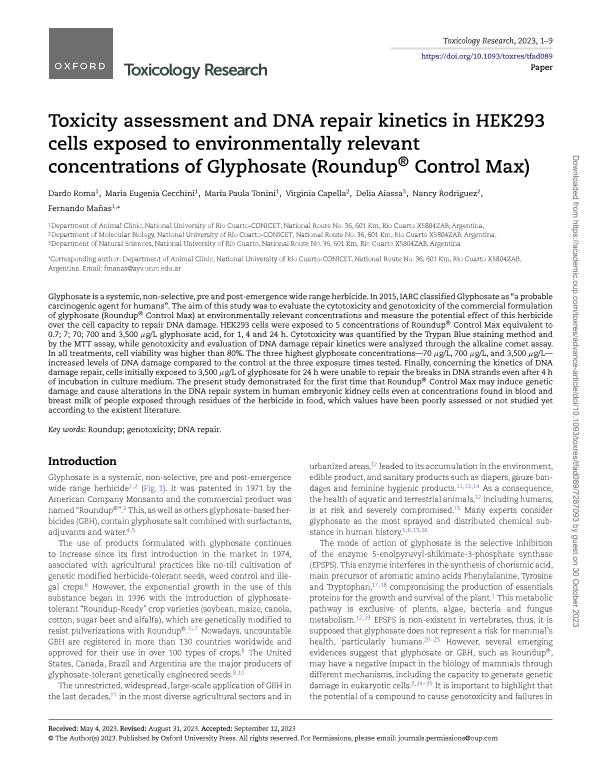Artículo
Toxicity assessment and DNA repair kinetics in HEK293 cells exposed to environmentally relevant concentrations of Glyphosate (Roundup® Control Max)
Roma, Dardo Andrés ; Cecchini, Maria Eugenia
; Cecchini, Maria Eugenia ; Tonini, Maria Paula; Capella, Virginia
; Tonini, Maria Paula; Capella, Virginia ; Aiassa, Delia Elba; Rodriguez, Nancy; Mañas, Fernando Javier
; Aiassa, Delia Elba; Rodriguez, Nancy; Mañas, Fernando Javier
 ; Cecchini, Maria Eugenia
; Cecchini, Maria Eugenia ; Tonini, Maria Paula; Capella, Virginia
; Tonini, Maria Paula; Capella, Virginia ; Aiassa, Delia Elba; Rodriguez, Nancy; Mañas, Fernando Javier
; Aiassa, Delia Elba; Rodriguez, Nancy; Mañas, Fernando Javier
Fecha de publicación:
09/2023
Editorial:
Oxford University Press
Revista:
Toxicology Research
ISSN:
2045-4538
Idioma:
Inglés
Tipo de recurso:
Artículo publicado
Clasificación temática:
Resumen
Glyphosate is a systemic, non-selective, pre and post-emergence wide range herbicide. In 2015, IARC classified Glyphosate as “a probable carcinogenic agent for humans”. The aim of this study was to evaluate the cytotoxicity and genotoxicity of the commercial formulation of glyphosate (Roundup® Control Max) at environmentally relevant concentrations and measure the potential effect of this herbicide over the cell capacity to repair DNA damage. HEK293 cells were exposed to 5 concentrations of Roundup® Control Max equivalent to 0.7; 7; 70; 700 and 3,500 μg/L glyphosate acid, for 1, 4 and 24 h. Cytotoxicity was quantified by the Trypan Blue staining method and by the MTT assay, while genotoxicity and evaluation of DNA damage repair kinetics were analyzed through the alkaline comet assay. In all treatments, cell viability was higher than 80%. The three highest glyphosate concentrations—70 μg/L, 700 μg/L, and 3,500 μg/L—increased levels of DNA damage compared to the control at the three exposure times tested. Finally, concerning the kinetics of DNA damage repair, cells initially exposed to 3,500 μg/L of glyphosate for 24 h were unable to repair the breaks in DNA strands even after 4 h of incubation in culture medium. The present study demonstrated for the first time that Roundup® Control Max may induce genetic damage and cause alterations in the DNA repair system in human embryonic kidney cells even at concentrations found in blood and breast milk of people exposed through residues of the herbicide in food, which values have been poorly assessed or not studied yet according to the existent literature.
Palabras clave:
DNA REPAIR
,
GENOTOXICITY
,
ROUNDUP
Archivos asociados
Licencia
Identificadores
Colecciones
Articulos (IITEMA)
Articulos de INSTITUTO DE INVESTIGACIONES EN TECNOLOGIAS ENERGETICAS Y MATERIALES AVANZADOS
Articulos de INSTITUTO DE INVESTIGACIONES EN TECNOLOGIAS ENERGETICAS Y MATERIALES AVANZADOS
Citación
Roma, Dardo Andrés; Cecchini, Maria Eugenia; Tonini, Maria Paula; Capella, Virginia; Aiassa, Delia Elba; et al.; Toxicity assessment and DNA repair kinetics in HEK293 cells exposed to environmentally relevant concentrations of Glyphosate (Roundup® Control Max); Oxford University Press; Toxicology Research; 12; 5; 9-2023; 970-978
Compartir
Altmétricas



